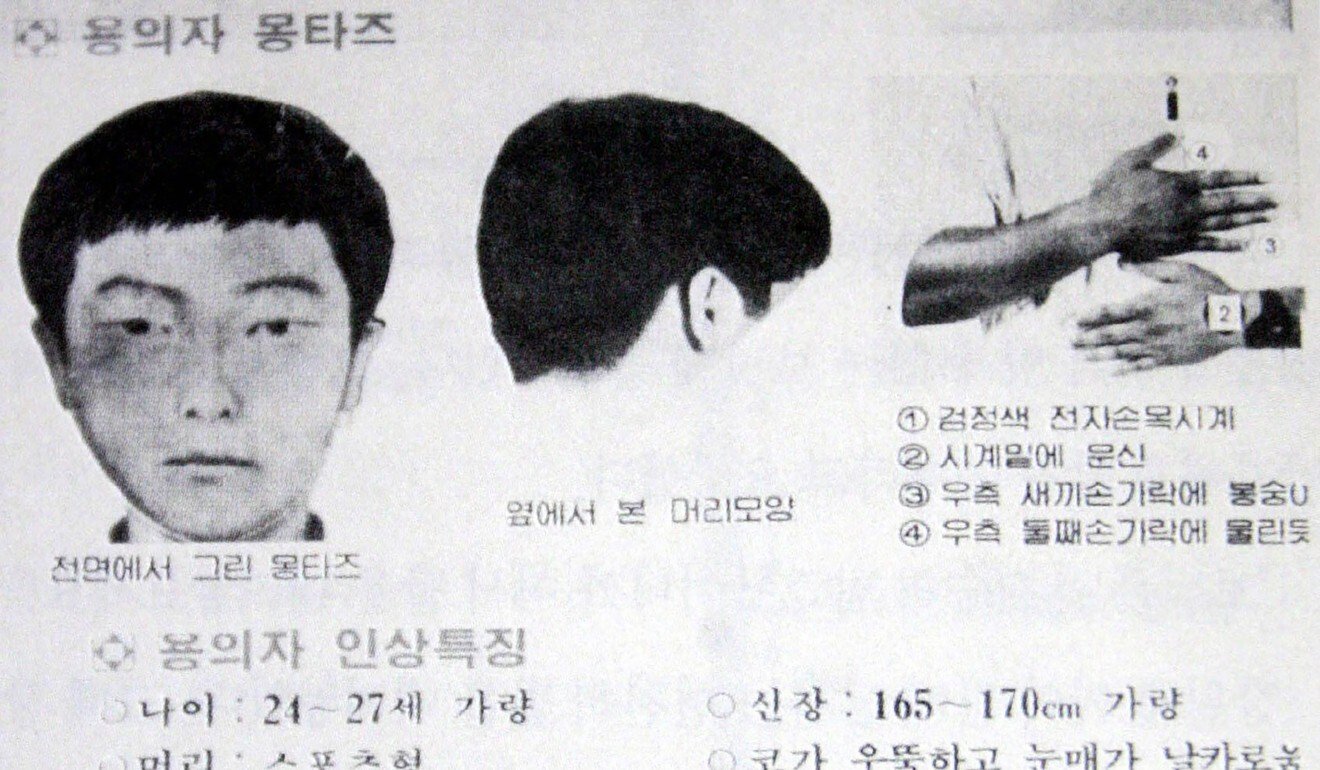
South Korea’s Hwaseong murders culprit admits to 14 killings, apologises to man wrongly jailed
- Lee Chun-jae will not face charges for the crimes committed between 1986 and 1991 as the statute of limitations expired in 2006
- The murders were South Korea’s most notorious cold case and inspired the 2003 film Memories of Murder directed by Academy Award-winner Bong Joon-ho
The prime suspect in South Korea’s infamous Hwaseong murders, who confessed to police last year, has admitted in court to 14 killings and apologised to another man who was jailed for 20 years after being wrongfully convicted of one of the crimes.
Between 1986 and 1991, there were 10 women raped and killed in Hwaseong County, about 43km south of Seoul. Victims’ bodies were found dumped in alleys or fields, all gagged, bound and strangled to death with their own stockings or clothes. Their genitals were also mutilated. Victims’ ages ranged from 14 to 71 and they were apparently attacked on their way home at night or early in the morning.
“I am the real culprit,” Lee, 57, told the court.

Lee cannot be charged with the Hwaseong murders because the statute of limitations expired in 2006. South Korea repealed the statute of limitations for murders in 2015 but that cannot be applied to crimes predating that decision.
After Lee’s public confession, there is also the question of justice for Yoon Seong-yeo, the man who was convicted and jailed for one of the killings.
Police suspected the eighth victim in Hwaseong, a 14-year-old girl raped and murdered at her home in 1988, was targeted by a copycat killer – all the other victims were found outdoors.
Even after Yoon was jailed, two more killings occurred in Hwaseong. Yoon was the only person ever convicted over any of the 10 deaths – the other nine remained unsolved.
However, developments in forensic DNA evidence yielded a breakthrough in September 2019, incriminating Lee, who was already behind bars, as a suspect in at least three of the 10 Hwaseong murders. The following month, Lee confessed to all the killings – including the crime that landed Yoon in prison for 20 years. In total, Lee committed 14 murders, 19 rapes and 15 attempted rapes between 1986 and 1991 before he killed his sister-in-law, police said.
This week’s proceedings were part of a retrial convened to overturn Yoon’s conviction in light of the DNA evidence implicating Lee, bringing the two men face-to-face in the courtroom.
“I sincerely apologise to Mr Yoon, who was wrongfully charged with the killings that I committed and had to serve prison time for no reason,” Lee told the court, showing little emotion and staring straight ahead.
“I also apologise to the victims and bereaved families. I will spend the rest of my life repenting for the wrongs that I committed.”
I don’t know why I did what I did. I just acted out of impulse
Yoon, now 53, has accused police of using torture when questioning him. Police have apologised to Yoon for his “unwarranted” imprisonment and suffering caused by “unrestrained” methods.
“Those times were much like a nightmare,” Yoon told CNN earlier this year. “When you don’t get sleep for three days, you don’t know what you said. You don’t remember what you did. You can’t think properly. You just go along with their questions, on and on.”
Lee, dressed in a blue-green prison uniform, told the court he felt only fleeting moments of remorse during his killing spree.
Police identify suspect in infamous cold case ‘Hwaseong murders’
“After killing one, I had guilty feelings for seconds but it soon passed over when I turned away from the scene,” he said. “That’s why I could move on.”
During the investigation of the Hwaseong murders, police logged more than 2 million days on the case, a record in South Korea. Lee said the intense scrutiny of his crimes caused him little concern. He continued with his daily routine, commuting to work as normal. Even when he passed the scenes of his crimes, he felt no additional guilt or discomfort, he said.
“I don’t know why I did what I did,” Lee said. “I just acted out of impulse.”

After the DNA breakthrough last year that linked Lee to the Hwaseong murders, police visited him in his prison cell to question him.
“‘Here it comes finally,’ I thought,” he recalled. “At first, I sought to avoid testifying but I decided to confess to all the crimes as I thought the case wouldn’t be buried forever following the DNA evidence.”
Lee also remembered watching Memories of Murder while in prison.
“I felt nothing while watching it. I just saw it as a movie,” he said. “The Hwaseong serial killings were never really on my mind and I seldom linked myself to them in my thoughts.”
A final ruling from the retrial is expected later this month. Should his conviction be overturned, Yoon could receive as much as US$4 million dollars in compensation from the state. He could also file separate damages suits against the police.
“It took all too long for the truth to come out,” Yoon said after the hearing. “But I appreciate [Lee’s] confession.”

